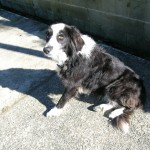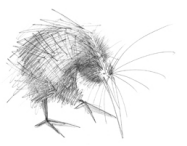At the Whangarei Heads, the kiwi are winning – but they still need your help to keep their population healthy and on the rise.
The most significant dangers to kiwi are: uncontrolled dogs, cars killing kiwi at night, stoats, and cats – who kill kiwi chicks. And, they can even be killed by mis-used rat poison, as you’ll hear in the report below.
As the Whangarei Heads kiwi population has increased from 80 kiwi in 2001, to 300 kiwi to date, it is critical that every kiwi be accounted for. We monitor about 15 kiwi – that leaves approximately 285 kiwi that go about their business without paying any attention to us!
If you find a dead kiwi, it is important for us to find out how or why it died – so we can prevent it from happening again.
It is easy to identify a kiwi that has been killed by a dog, for example. Often, we can even then determine who the dog owner is, and let them know what happened.
Another significant cause of kiwi deaths is road kill. We all know that killing possums on the road is practically considered a time-honoured tradition, but at Whangarei Heads, we’re leaving possum control to the traps. You never know – that animal you see on the road at night is just as likely to be a kiwi as a possum!
If you’re a landowner who is interested in trapping for stoats and weasels, contact us at info@backyardkiwi.org
And, if you’re a cat owner, keep your cat in at night – don’t let it be a kiwi chick killer!
Rat Poison – A Potential Kiwi Killer
Recently, when two Parua Bay residents found a kiwi on their drive in the middle of the day, at first they jumped for joy.
Unfortunately, it soon became obvious that all was not well with this unusual visitor. It was stumbling around as though it were blind. Knowing that they MUST NOT TOUCH or capture a kiwi, the worried locals phoned their Landcare Group who were able to call in our trapper Todd Hamilton. Todd was able to go around straight away, but by the time he got there the little kiwi had stumbled off into the bush and could not be found.
Most likely, the kiwi chick was suffering from rat bait poisoning (Broylificom) which local residents had bought at the supermarket and they had not used kiwi safe bait stations.
If you are planning to use poisons always seek advice on the safest ways to use them and which ones to use. We recommend RatAbate because it causes the least damage to the food chain. Place your bait in the middle of a length of pipe to ensure your friends such as kiwi cannot get at it.
Use pipe 40-50 mm diameter by 400 mm long approximately, secure to the ground with bent wire or place a rock on it. RatAbate is available from the Northland Regional Council in Water Street, Whangarei.




